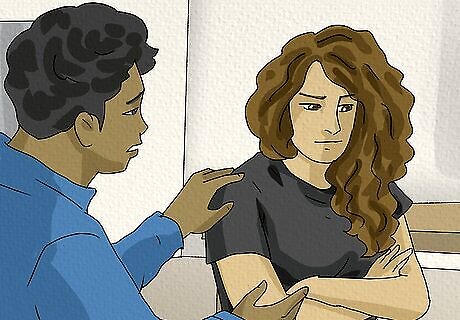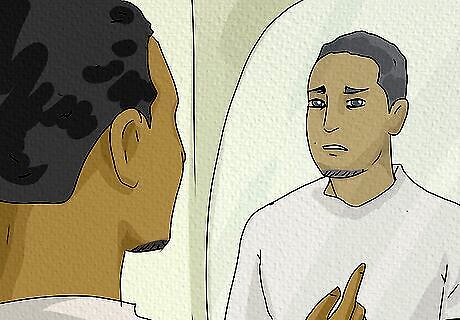
views
Attraction

The narcissist attracts the empath with their charming image. When an empath first meets a narcissist, they seem like a successful, attractive, charismatic person who has everything together. They'll believe the hand of fate played a role in their meeting this person—they might even think of them as a potential soul mate. The narcissist works very hard in this initial stage to attract the empath and keep them interested. If the empath wants to resist the attraction, they might remind themselves that if something seems too good to be true, it probably is. If they scratch beneath the surface, they'll see that the narcissist's appearance is deceiving. The narcissist needs the empath because they are so giving, compassionate, and caring—basically, everything a narcissist is not.
Illusion

The relationship seems to be a picture-perfect fairy-tale romance. Once the narcissist has the empath under their spell, they start love-bombing. The narcissist is so attentive, so caring, so loving, that the empath wonders where this person has been all their life. The narcissist is so good at this technique because they simply mirror the empath's feelings and behaviors back to them. The empath is so blinded by infatuation that they don't even realize this is all just an illusion—this is not at all who the narcissist really is. At this stage, the relationship seems perfect. There's not much the empath can do, but they wouldn't want to leave at this stage anyway, because everything is wonderful.
Devaluation

The narcissist criticizes the empath to chip away at their self-esteem. This is where the narcissist's true colors start to appear. They start small, making little critical comments to the empath here and there—they might even pass them off as jokes. But gradually, these comments become more and more serious, and critical, and wear away at the empath's confidence. For example, the narcissist might criticize the way the empath dresses when they go out to dinner and say the empath has no sense of style. The more they repeat similar comments, the less confident the empath will be about how they dress. If, at this point, the empath sets boundaries and refuses to internalize the projected feelings of the narcissist, the relationship would likely come to a natural end. An empath with codependent tendencies may be unwilling or unable to set boundaries because they're worried about displeasing the narcissist.
Trauma Bonding

The empath tries to figure out what they're doing wrong. As the narcissist continues to chip away at the empath's self-esteem, the empath finds themselves wondering what happened to that fairy-tale relationship they thought they had. They felt loved initially, so they figure they must've done something to cause this change in their partner. They do everything they can to please the narcissist in the hopes of getting some of that praise and love in return. At this stage, the empath could realize what was going on and try to end the relationship. But typically, the narcissist would just go back to the illusion stage and turn on the charm to win them back. The narcissist will continue cycling back and forth between love-bombing and devaluation until they have control over the empath. To escape, the empath has to be able to resist the love-bombing and ignore the narcissist.
Control

The narcissist preys on the empath's need to care for them. It is in this stage that the lines between an empath and someone who is codependent become blurred. Most empaths would have a full sense of self and would realize at this stage that the narcissist's demands were unrealistic. But an empath with codependent tendencies wouldn't realize that because they would be too caught up in their need to please and care for others. Someone who is codependent believes that their value and worth as a person comes from the extent to which they can help and please others. A narcissist will use this tendency to their advantage to get the codependent empath to continue to sacrifice themselves and do more and more for the narcissist. An empath can escape the relationship at this stage if they start to recognize that they're losing themselves to the narcissist and their care is not having a positive effect on the narcissist.
Centering

The narcissist constantly demands attention and support. At this stage, the empath wants nothing more than to please the narcissist. They think that if they just love the narcissist a little more, they'll come around—and the empath will experience that perfect relationship they saw at the start. The problem is that the perfect relationship was an illusion and the empath can never love the narcissist enough to make them whole. No matter what the empath does, the narcissist will inevitably find fault with it. There's always going to be something more the empath needs to do for the narcissist to come around. If the empath decides to balk at this stage and refuses to do more, the narcissist may give them a little love-bombing to bring them back into the fold. This reinforces the trauma bond so the empath is willing to renew their efforts. It's possible for the empath to escape the toxic relationship at this point if they recognize that nothing they do is ever going to be good enough for the narcissist and decide to cut their losses.
Defeat

The empath's efforts to help the narcissist aren't working. All their life, the empath has been able to heal people with their love and care. But the narcissist seems immune to the empath's love—nothing they do seems to work. The empath starts to feel frustrated. That frustration can ultimately lead to depression. Unless the empath has previously been in a relationship with a narcissist, they've likely never experienced an instance where they weren't able to heal someone or fix their problems. This can be mind-blowing for the empath. If the empath is willing to admit defeat and move on, they can break the cycle here and leave the relationship.
Feeling Stuck

The empath walks on eggshells, afraid to upset the narcissist. At this point, the narcissist has made the empath feel as though they're less competent, less special, or less valuable. They previously sought the narcissist's praise and approval—but by now, they know they're not going to get it. Instead, they settle for simply not making the narcissist angry. The empath is constantly tense and anxious during this phase of the relationship. They're always on their guard for anything that might set the narcissist off. Typically, the empath is doing a lot of things behind the scenes that the narcissist might not even be aware of. For example, if the empath knows that the narcissist gets upset when there are dishes in the sink, they make sure the dishes are done before the narcissist gets home.
Resistance

The empath voices their opinion about the relationship. Despite having done everything to please the narcissist, the empath still isn't getting any love, approval, or appreciation. At this point, the empath has started to realize that their emotional needs aren't being met (and likely aren't going to be met) in this relationship. They finally decide to say something about it, but the narcissist isn't going to take too kindly to having their flaws pointed out. A narcissist is typically uninterested in someone who's figured out who they really are. So when the empath starts to resist the narcissist's control, the narcissist likely has one foot out the door. The narcissist might also pretend to go along with the empath's suggestions. For example, if the empath says the narcissist should go to therapy, they will—but they won't take it seriously and will likely start skipping out on appointments. If the narcissist stays past the resistance stage, they believe the empath still has more to give. They placate the empath to keep them around.
Gaslighting

The narcissist tells the empath they are being too sensitive. Narcissists are typically very careful about what information they do and do not share. They carefully craft their narrative so that they look like the hero and the empath looks like the one who is to blame for all of the problems in the relationship. If only the empath weren't so sensitive, everything would be fine. The narcissist gaslights the empath so they believe their thoughts and feelings are wrong. The empath knows they're highly sensitive, so this plays into their own deeply held insecurities about themselves. Because the things the narcissist say hold a grain of truth for the empath, they're more inclined to believe them. Reaching out to trusted friends and family members at this stage can help the empath realize that the narcissist is feeding them a false narrative. This support and validation can empower them to leave the relationship.
Confusion

The empath's self-esteem is so shattered that they question reality. The narcissist has continually attacked and eroded the empath's confidence so completely that they have a hard time recognizing what's right and what's wrong anymore. At this point, they tend to rely heavily on what the narcissist says about reality because they don't trust themselves to figure it out. At this stage, the narcissist has free reign to rewrite the empath's understandings and beliefs about themselves in a way that benefits the narcissist. For example, the empath might've previously thought that their sensitivity and empathy were strengths. But now, the narcissist is telling them that these traits are problems. This turns the empath's entire perspective upside-down. This is another stage where talking to trusted friends and family can help the empath set themselves straight.
Self-Blaming

The empath starts to blame themselves for the narcissist's actions. When the narcissist has sufficiently eroded the empath's self-confidence, the empath reaches the conclusion that all the problems in the relationship are indeed their fault. They consistently tell themselves that if only they'd done this or that, they'd still have that picture-perfect relationship they glimpsed at the beginning of their courtship. If the empath still doesn't realize that the perfect relationship they started with was an illusion created by the narcissist's love-bombing, they'll still think it's possible to return to that point. The narcissist typically reinforces the empath's self-blame by agreeing with them and playing the victim, which makes the empath feel even worse.
Denial

The empath finds excuses for the narcissist's behavior. Sometimes, the narcissist suggests excuses, but it's just as likely that the empath is making them up on their own. The empath tells themselves and others these excuses to paint themselves as the problem in the relationship. They understand the narcissist and know they wouldn't act that way if it weren't for something the empath has said or done. For example, the empath might say that the narcissist wouldn't cheat on them if they were more attentive and wanted to have sex more often. This stage preys on the empath's need to feel as though they understand and empathize with others. The empath likely feels better at this point, because they think they've unlocked the reasons the narcissist acts the way they do.
Survival Mode

The empath avoids doing anything to rock the boat. This stage is much like the "feeling stuck" stage of the relationship. The big difference is that at this point, the empath no longer believes they're worthy of approval or praise from the narcissist. They also don't believe that they're capable of "fixing" or healing the narcissist. Instead, they're focused solely on not attracting the narcissist's anger. At this point, many narcissist-empath relationships become abusive (if they aren't already). If the empath is being physically abused, survival mode can take on a literal meaning. In survival mode, it's very difficult for the empath to find any way out of the mess. They likely believe they're solely responsible for creating the mess in the first place, so they believe they deserve the situation they're in. If you find yourself in survival mode in a relationship, it's crucially important to seek help from trusted friends and family members who will remind you that you don't deserve it. They'll support you so you can get the help you need.
Retreat

The empath disconnects from everyone around them. At this stage, the empath feels so much shame from the self-blaming and the narcissist's anger that they isolate themselves. They're embarrassed to be around friends and family because they feel guilty about the state of their relationship. With their self-esteem in shambles, they also feel unworthy of receiving care and support from anyone else. The empath starts to spend a lot of time alone. They might pull out of activities they normally did or stop going out with friends. If the empath has fallen into a depression, that can only make the self-isolation worse. In the throes of depression, the empath no longer has the energy to go out and do things, even if they wanted to.
Realization

The empath starts to understand the nature of the relationship. The empath's retreat into themselves isn't an entirely bad thing because they do a lot of thinking. As they're thinking about and analyzing their relationship, they start to realize that they aren't, in fact, to blame for the problems. They see that the narcissist has been doing all the taking and they've been doing all the giving. When the empath realizes this, it can feel as though a weight has been lifted. They might find that they suddenly have more energy and motivation to do things. The empath starts to become less anxious and more open, more like their old self. If the relationship is abusive, they might reach out to friends or family members and start making an escape plan.
Confrontation

The empath confronts the narcissist about their behavior. By this stage, the empath knows exactly what's going on in the relationship. They'll sit down with the narcissist and tell them about it. This won't go over well with the narcissist because it doesn't mesh with their narrative. If the narcissist believes the empath still has more to give, they'll likely agree to get help and start love-bombing the empath again. They'll lead the empath to believe that they've finally succeeded in helping the narcissist after all. On the other hand, if the narcissist believes the empath is drained, they'll resist the empath and escalate the fight, resulting in the end of the relationship.
Discard

The relationship ends and the two go their separate ways. When the narcissist decides that the empath has nothing more to give, they'll typically leave and act as though nothing happened. Nothing changes in the life of the narcissist—they simply go out in search of another target, who they'll probably find relatively quickly. If the narcissist ends the relationship, it usually happens suddenly and out of nowhere. The empath might feel as though the rug has been pulled out from under them—they'll be completely disoriented, shocked, and confused. Even if the empath makes the decision to end the relationship, they'll likely be extremely upset. It can be even more hurtful for the empath to see the narcissist moving on as though nothing happened. Regardless of who ends the relationship, the best course of action for the empath is to go "no contact" with the narcissist. Block them on social media, block their phone number, and leave no forwarding address.
Healing

The empath starts to reflect and learn from their experience. Now that the empath has separated from the narcissist, they can start the healing process. They begin to put the pieces together and understand the true nature of the narcissist. As they reflect, they likely see red flags that they didn't notice in the moment. They make a note of things to watch out for in the future so they don't repeat that experience. During this initial healing process, the empath is likely still in a lot of pain. They're grieving the loss of the relationship and are very vulnerable to love-bombing from anyone else. Therapy can help guide the empath through the healing process and provide them with support and strength to help recover their self-esteem. If the empath has gone no-contact with the narcissist, it's likely the narcissist will try to gain the empath's attention again by spreading rumors about them or reaching out to mutual friends or acquaintances.
Hoovering

The narcissist tries to pull the empath back into their life. Named for a popular brand of vacuum cleaners, this stage of the narcissist-empath relationship features more love-bombing from the narcissist. After the empath has done some healing, the narcissist realizes that the empath now has more to give—and the narcissist wants to drain them again. An empath who resists the pull of the narcissist can emerge from this stage pretty much unscathed. If the empath chose to go no-contact with the narcissist after discard, the narcissist might never get the chance to try to hoover the empath back—but that doesn't mean they won't try. Sometimes, a narcissist will attempt to draw an empath back in by talking about them to mutual friends. They might ask after the empath or tell the friend to send the empath a message on their behalf. Make sure your friends know not to interact with the narcissist.
Recovery

The empath resists contact with the narcissist and moves on for good. If the empath reaches this stage, it means the narcissist's attempt to hoover them back was unsuccessful. The empath starts to feel lighter, more confident, and more sure of themselves. They still have a lot of work to do, but they know that they're finally free of the narcissist—that person no longer has any control over them. Recovery can be difficult if the empath and the narcissist can't go completely no-contact—for example, if they have children together. If full no-contact isn't possible, try the "gray rock" method when interacting with the narcissist. As a gray rock, you make yourself as unemotional and boring as possible so the narcissist won't be interested in you.



















Comments
0 comment